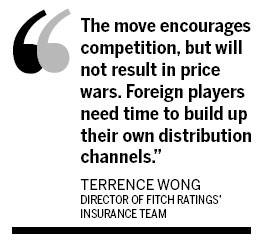Fitch Ratings maintains a "stable" outlook for China's insurance sector, but recent exits by overseas investors' stirred concerns about the sector's profitability.
"Our view is that the sector will be stable over the next 12 to 24 months," Terrence Wong, director of Fitch's insurance team, said on Monday.
Property insurers' premiums are set to register double-digit growth this year and in 2013, but recent regulatory changes could intensify competition the ratings agency said.
For life insurers, which have seen a sluggish first half, premium income will grow faster next year, supported by the country's relatively low level of life-insurance penetration.

The agency's comments were made days after HSBC Holdings PLC struck a $9.4 billion deal to sell its entire 15.6 percent stake in Ping An Insurance (Group) Company of China Ltd, giving the bank a $2.6 billion profit.
The sale follows a decision in July by the Carlyle Group LP, the world's second-largest private equity company, to sell $738 million of shares in China Pacific Insurance (Group) Co Ltd.
Wong denied the share sales reflect a lack of confidence by foreign investors in the insurance sector. "The decision by some investors to exit is made based on their own investment needs, and doesn't reflect the sector's overall strength," Wong said.
China's insurance market has forged ahead with an average annual growth rate of 19 percent over the past decade, as insurers' total assets increased 10 times, according to the China Insurance Regulatory Commission. But growth stalled in 2011, when rules were tightened on selling policies over the counter at banks. Total premium income dropped 1.3 percent in 2011.
Joyce Huang, director of Fitch's Asia Pacific Insurance team, said she expected life insurers' premium income to grow 2.4 percent this year. Growth will also be single-digit in 2013, but will be faster than this year.
Huang said one major factor that impacts life insurers' ratings is the possibility that they may be exposed to more risks from new investments in light of the commission's measures to liberalize the sector.
This year, the commission gave Chinese insurers more flexibility to diversify their investments to include credit-related financial products such as banks' wealth management products and asset-backed securities.
They are allowed to hold up to 30 percent of their assets in those products. In addition, insurers can now invest up to 20 percent of their total assets in infrastructure debt and property-related assets, up from 10 percent previously.
"These measures have tended to bring in more risks, which may affect insurers' ratings," said Huang.
Premium growth will be faster for property insurers, with Wong expecting a 15 percent increase in the first half of 2013.
But their margin will be squeezed by the commission's decision this year to build a market-oriented pricing system, as well as introducing foreign insurers, in the third-party liability automobile insurance market.
"The move encourages competition, but will not result in price wars. Foreign players need time to build up their own distribution channels," said Wong.
gaochangxin@chinadaily.com.cn
